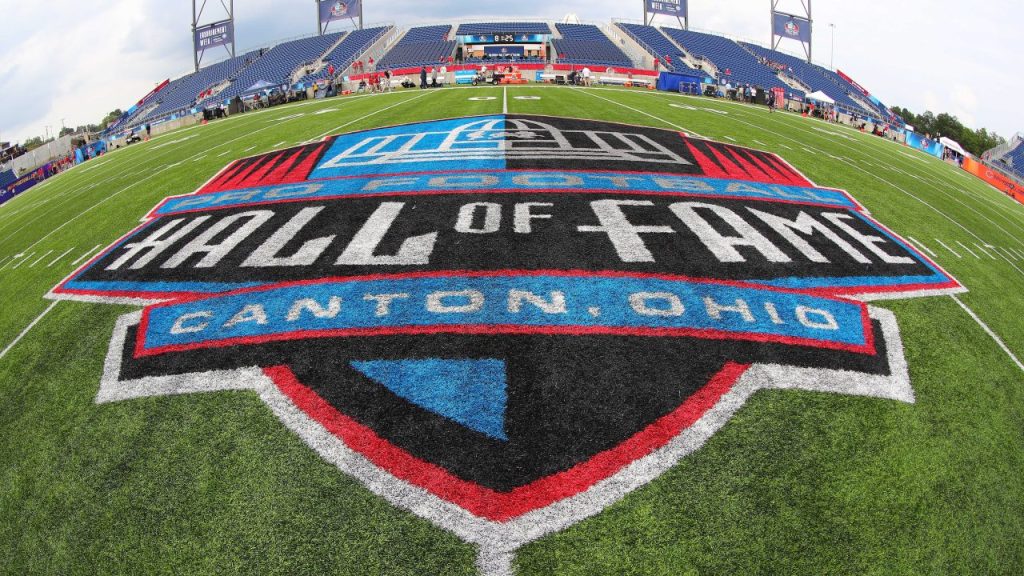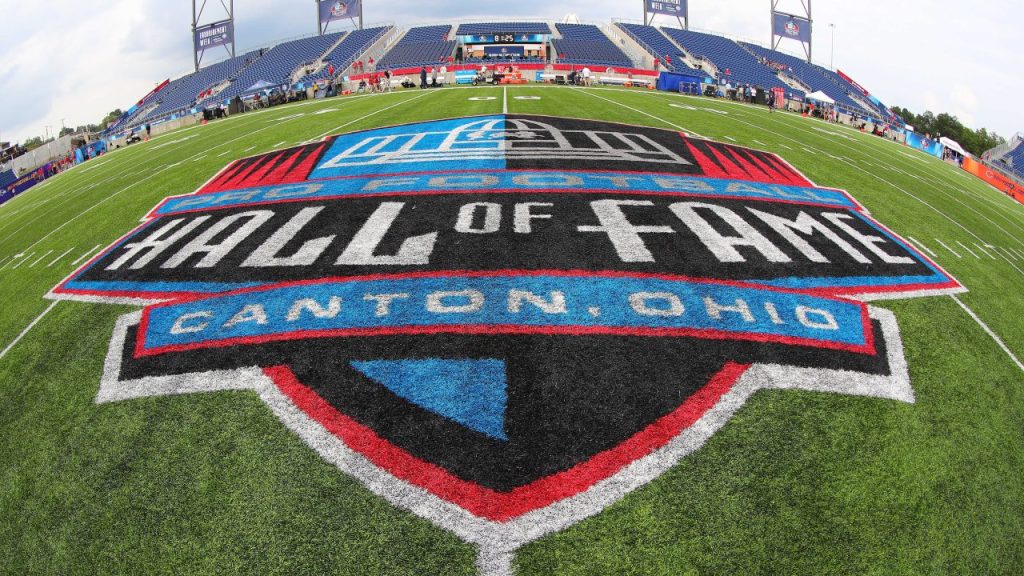Turbulent Times for Hall of Fame Resort: Stock Delisting Looms In a shocking turn of events, Hall of Fame Resort & Entertainment Co., the brainchild behind the ambitious Hall of Fame Village in Canton, Ohio, is facing a severe crisis that could have far-reaching consequences for the company and its stakeholders. According to a recent report by the Canton Repository, the resort’s stock is at risk of being delisted from a major exchange due to its declining market value and inadequate financial performance. As the sports and entertainment industry continues to evolve, the once-promising Hall of Fame Resort is now grappling with the very real possibility of losing its stock listing. In this article, we’ll delve into the details of this situation and explore what it means for investors, employees, and the community at large.
Hall of Fame Resort & Entertainment Co. Faces Delisting Threat

Hall of Fame Resort & Entertainment Co., a leading player in the amusement and recreation services sector, is facing a potential delisting threat from Nasdaq. The company, which is based in Canton, Ohio, has received a notice from Nasdaq stating that it failed to meet the exchange’s requirement to hold an annual meeting within 12 months after the end of its fiscal year on December 31, 2023.
The notice, which was issued on January 10, 2025, does not immediately affect the company’s stock listing. However, if the company fails to submit a plan to regain compliance by February 24, 2025, its securities may be delisted and possibly traded over-the-counter. This could have significant implications for the company’s investors and its ability to raise additional financing in the future.

Company Background and Current Challenges
Overview of Hall of Fame Resort & Entertainment Co.
Hall of Fame Resort & Entertainment Co. is a resort and entertainment company that operates in the amusement and recreation services sector. The company is based in Canton, Ohio, and its operations include the development and management of a football-themed campus around the Pro Football Hall of Fame.

Analysis of the Company’s Financial Health
The company’s financial health has been a major concern in recent times. According to InvestingPro data, the company has a weak financial health score of 1.55 and a significant debt burden, with a total debt to capital ratio of 98%. This has raised concerns about the company’s ability to meet its financial obligations and invest in its growth initiatives.
Recent Events and Their Impact on the Company
Recently, Jerome Bettis, a Class A director, resigned from the company’s board effective January 16, 2025. The company has also announced the postponement of its 2024 Annual Meeting of Stockholders, as it considers a non-binding proposal from IRG Canton Village Member, LLC to go private. These developments have added to the uncertainty surrounding the company’s future and its ability to regain compliance with Nasdaq’s listing requirements.
Nasdaq Listing Requirements and Potential Delisting
Explanation of Nasdaq’s Listing Requirements
Nasdaq has a set of listing requirements that companies must meet to maintain their listing on the exchange. These requirements include holding an annual meeting within 12 months after the end of the company’s fiscal year, maintaining a minimum stock price of $1, and meeting certain financial and corporate governance requirements.
Notice Received by the Company and Plan to Regain Compliance
The company has received a notice from Nasdaq stating that it failed to meet the exchange’s requirement to hold an annual meeting within 12 months after the end of its fiscal year on December 31, 2023. The company has until February 24, 2025, to submit a plan to regain compliance. If the plan is accepted, Nasdaq may grant the company until June 30, 2025, to fulfill the annual meeting requirement.
Implications of Potential Delisting
If the company fails to regain compliance with Nasdaq’s listing requirements, its securities may be delisted and possibly traded over-the-counter. This could have significant implications for the company’s investors, including reduced liquidity and increased volatility. It could also make it more difficult for the company to raise additional financing in the future.
Reverse Stock Split and Its Impact
Explanation of the Reverse Stock Split
The company recently announced a 1:22 reverse stock split, which reduced the number of shares outstanding and increased the value of each share. The reverse stock split was implemented to prevent the company’s stock from being delisted by Nasdaq due to its low stock price.
Analysis of the Stock’s Performance Before and After the Split
Before the reverse stock split, the company’s stock price was trading below $1. After the split, the stock price increased to $9.35, but it has since fallen to $7.84. The reverse stock split has had a significant impact on the company’s stock price, but it has not addressed the underlying issues facing the company.
Potential Consequences of the Reverse Stock Split
The reverse stock split may have a negative impact on investor confidence, as it can be seen as a desperate measure to prevent delisting. It may also lead to a decrease in liquidity and an increase in volatility, making it more difficult for investors to buy and sell the company’s stock.
Earnings and Financial Performance
Overview of the Company’s Q2 2024 Earnings
The company reported a 23% year-over-year decline in revenues to $4.7 million and a net loss of $15.8 million in Q2 2024. The company’s financial performance has been impacted by a number of factors, including the COVID-19 pandemic and the decline in the amusement and recreation services sector.
Analysis of the Company’s Financial Position
The company’s financial position is precarious, with a significant debt burden and a weak financial health score. The company has a total debt to capital ratio of 98%, which raises concerns about its ability to meet its financial obligations.
Discussion of the Company’s Revised Revenue Range and Future Growth Prospects
The company has revised its 2024 revenue range to $20 million to $22 million, which is lower than its previous forecast. The company’s future growth prospects are uncertain, and it will need to address its underlying issues to achieve its growth targets.
Growth Strategies and Expansion Plans
Overview of the Company’s Plans to Expand Its Gaming Vertical
The company plans to expand its gaming vertical and boost profitability from 2025 onwards. The company is investing in new assets, including the Gameday Bay Waterpark and an on-site hotel, which are expected to drive growth and increase revenue.
Analysis of the Gameday Bay Waterpark and On-Site Hotel Projects
The Gameday Bay Waterpark and on-site hotel projects are expected to be major drivers of growth for the company. The projects will provide new revenue streams and help to boost profitability. However, the company will need to secure financing and partnerships to complete the projects.
Discussion of the Company’s Efforts to Secure Financing and Partnerships
The company is working to secure financing and partnerships to support its growth plans. The company has announced a deal to finance Phase 2 of its project, which includes a $50 million sale leaseback agreement with Blue Owl Capital. The company is also exploring other financing options and partnerships to support its growth initiatives.
Regulatory Environment and Investor Confidence
Discussion of the Regulatory Environment and Nasdaq’s Rules
The regulatory environment and Nasdaq’s rules are critical factors that affect the company’s listing status and investor confidence. The company must comply with Nasdaq’s listing requirements to maintain its listing status and avoid delisting.
Analysis of the Potential Impact of a Delisting on Investor Confidence
A delisting could have a significant impact on investor confidence, as it could lead to reduced liquidity and increased volatility. Investors may lose confidence in the company’s ability to meet its financial obligations and achieve its growth targets.
Implications for Morningpicker Subscribers and Investors in General
Morningpicker subscribers and investors in general should be aware of the risks and uncertainties facing the company. The company’s delisting threat and financial challenges could have significant implications for investors, and it is essential to monitor the company’s progress and potential outcomes.
Investor Insights and Analysis
Insights from Singular Research’s Buy-Long Term Rating and Revised Price Target
Singular Research has maintained a Buy-Long Term rating for the company but lowered its 12-month price target. This suggests that the company has potential for long-term growth, but its short-term prospects are uncertain.
Analysis of the Company’s Future Prospects and Potential Risks for Investors
The company’s future prospects are uncertain, and investors should be aware of the potential risks. The company’s delisting threat, financial challenges, and competitive landscape could impact its ability to achieve its growth targets and meet its financial obligations.
Discussion of the Importance of Monitoring the Company’s Progress and Potential Outcomes
It is essential for investors to monitor the company’s progress and potential outcomes. The company’s ability to regain compliance with Nasdaq’s listing requirements, achieve its growth targets, and meet its financial obligations will be critical factors in determining its future success.
Investors can stay up-to-date with the latest developments and analysis on Hall of Fame Resort & Entertainment Co. through Morningpicker’s Pro Research Report, which provides expert insights and comprehensive analysis of the company’s financial position and prospects.
- Access to over 15 additional ProTips and in-depth analysis
- Expert insights into the company’s financial health and growth prospects
- Comprehensive analysis of the company’s competitive landscape and industry trends
Conclusion
In conclusion, the recent announcement that Hall of Fame Resort & Entertainment Co. is facing potential stock delisting due to its failure to meet the minimum bid price requirement on the NASDAQ exchange is a pressing concern for investors and stakeholders alike. As discussed in this article, the company’s struggles to regain compliance have been ongoing, with the latest deadline fast approaching. The implications of delisting are far-reaching, potentially impacting the company’s access to capital, reputation, and overall viability.
The significance of this development extends beyond the company itself, as it raises questions about the broader sports and entertainment industry’s ability to navigate the challenges of the post-pandemic landscape. As the world slowly returns to normal, companies like Hall of Fame Resort & Entertainment Co. must adapt and innovate to stay ahead of the curve. The fate of this iconic brand serves as a cautionary tale for other businesses operating in this space, highlighting the importance of agility, resilience, and strategic planning in the face of uncertainty.

